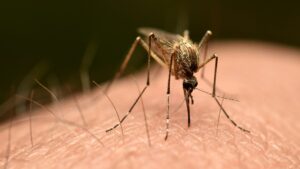A 5-week-old baby in Boston is currently fighting for her life after being bitten by a tick. The baby, Lily Sisco, was bitten while on a walk with her family on Martha’s Vineyard, according to her mother, Tiffany Sisco. After returning from the walk, Tiffany Sisco found a tick on Lily’s ankle and removed it. However, a week later, Lily started to develop a fever of 102 degrees.
Concerned about her condition, the Siscos took Lily to the emergency room and she was subsequently transferred to Massachusetts General Hospital in Boston for specialized care. Lily’s situation worsened as she began experiencing seizures, leading to her placement in the PICU (pediatric intensive care unit). It was later revealed that Lily had suffered brain damage due to an infection.
Medical experts suspect that Lily’s illness may have been caused by the Powassan virus, which is transmitted through the bite of an infected deer tick. Although cases of Powassan virus are rare, they have been on the rise in recent years, particularly in the Northeast and Great Lakes regions of the United States.
Dr. Marc Siegel, a senior medical analyst, explained that the Powassan virus has a quicker transmission rate compared to Lyme disease, with an incubation period of one to four weeks. While there have only been a few confirmed cases of Powassan virus each year in the U.S., they have become more prevalent in certain regions.
The Martha’s Vineyard health department released a statement confirming Lily’s possible infection with the Powassan virus. They noted that cases of Powassan virus on the island have been rare, with only one confirmed case in the past 20 years and three statewide cases reported this year.
Health officials emphasized that while the virus is present in deer ticks on Martha’s Vineyard, severe diseases caused by the virus remain uncommon. Researchers have been actively monitoring the tick population on the island to better understand and prevent the spread of tick-borne diseases.
Symptoms of Powassan virus can include fever, headache, vomiting, and weakness, with possible severe cases leading to brain and spinal cord inflammation. While anyone can develop severe symptoms, older adults, children, and immunocompromised individuals are at a higher risk.
There is currently no vaccine available for Powassan virus. Health experts advise taking precautions to prevent tick bites, especially during peak tick activity seasons. Lily’s case serves as a reminder of the dangers associated with tick-borne illnesses and the importance of early detection and treatment.
Dr. Parada, a medical advisor at the National Pest Management Association (NPMA) in Chicago, emphasized the long-term symptoms that severe Powassan virus disease can cause, such as headaches, memory issues, and muscle weakness.
Treatment for Powassan virus focuses on managing symptoms since there is no specific medication available. Experts recommend preventing tick bites as the most effective way to avoid Powassan virus and other infectious diseases.
Prevention strategies include using EPA-registered insect repellents with at least 20% DEET, wearing light-colored clothes with long sleeves and pants tucked into socks, and conducting thorough tick checks after being outdoors. (iStock)
To prevent tick bites, it is recommended to use EPA-registered insect repellents with 20% DEET, wear protective clothing, and perform tick checks on yourself, family, and pets after outdoor activities, according to Dr. Parada.
To make your yard less appealing to ticks, Dr. Parada suggested keeping grass short and creating a barrier with gravel or wood chips along the edge of your property. He emphasized the need for immediate attention to prevention efforts due to Powassan virus’s rapid transmission, severe health consequences, and limited treatment options.
Melissa Rudy is senior health editor and a member of the lifestyle team at Fox News Digital. Story tips can be sent to melissa.rudy@fox.com.





